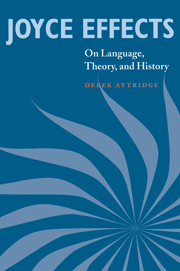Book contents
- Frontmatter
- Contents
- Acknowledgments
- References and abbreviations
- Preface
- Introduction: On being a Joycean
- Chapter 1 Deconstructive criticism of Joyce
- Chapter 2 Popular Joyce?
- Chapter 3 Touching ‘Clay’: reference and reality in Dubliners
- Chapter 4 Joyce and the ideology of character
- Chapter 5 ‘Suck was a queer word’: language, sex, and the remainder in A Portrait of the Artist as a Young Man
- Chapter 6 Joyce, Jameson, and the text of history
- Chapter 7 Wakean history: not yet
- Chapter 8 Molly's flow: the writing of ‘Penelope’ and the question of women's language
- Chapter 9 The postmodernity of Joyce: chance, coincidence, and the reader
- Chapter 10 Countlessness of livestories: narrativity in Finnegans Wake
- Chapter 11 Finnegans awake, or the dream of interpretation
- Chapter 12 The Wake's confounded language
- Chapter 13 Envoi: judging Joyce
- Works cited
- Index
Chapter 6 - Joyce, Jameson, and the text of history
Published online by Cambridge University Press: 22 September 2009
- Frontmatter
- Contents
- Acknowledgments
- References and abbreviations
- Preface
- Introduction: On being a Joycean
- Chapter 1 Deconstructive criticism of Joyce
- Chapter 2 Popular Joyce?
- Chapter 3 Touching ‘Clay’: reference and reality in Dubliners
- Chapter 4 Joyce and the ideology of character
- Chapter 5 ‘Suck was a queer word’: language, sex, and the remainder in A Portrait of the Artist as a Young Man
- Chapter 6 Joyce, Jameson, and the text of history
- Chapter 7 Wakean history: not yet
- Chapter 8 Molly's flow: the writing of ‘Penelope’ and the question of women's language
- Chapter 9 The postmodernity of Joyce: chance, coincidence, and the reader
- Chapter 10 Countlessness of livestories: narrativity in Finnegans Wake
- Chapter 11 Finnegans awake, or the dream of interpretation
- Chapter 12 The Wake's confounded language
- Chapter 13 Envoi: judging Joyce
- Works cited
- Index
Summary
‘History is what hurts’: this is one of Fredric Jameson's many artfully phrased aphorisms in his influential study The Political Unconscious, a book that introduced a new, and seldom surpassed, sophistication into Marxist studies of literature in 1981 and that has to be taken into account by anyone working on the relation between ‘literature’ and ‘history’. The passage continues, in characteristic Jamesonian vein, ‘This is indeed the ultimate sense in which History as ground and untranscendable horizon needs no particular theoretical justification: we may be sure that its alienating necessities will not forget us, however much we might prefer to ignore them’ (102).
History is ‘a nightmare from which I am trying to awake’: this is Stephen Dedalus's definition, produced for the benefit of Mr Deasy in ‘Nestor’, the Ulyssean episode for which, according to Joyce's schema for the book, history is the designated art. Stephen's comment is followed by the silent self-interrogation: ‘What if that nightmare gave you a back kick?’ (U 2.377–9).
Both Jameson and Stephen are vividly aware of the double manifestation of history in our lives: on the one hand as that which, operating from outside the human capacity to construct and construe signs, imposes limits upon – and, though this is less often emphasized, opens up possibilities for – thought and action; and on the other hand as that which communities make and remake under the shifting pressures of ideological and material needs.
- Type
- Chapter
- Information
- Joyce EffectsOn Language, Theory, and History, pp. 78 - 85Publisher: Cambridge University PressPrint publication year: 2000



